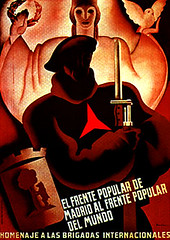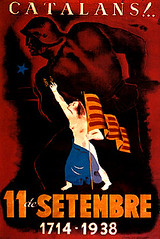Nous Sommes Tous Communards
A person of bourgeois origin goes through life with some expectation of getting what he wants, within reasonable limits. Hence the fact that in times of stress 'educated' people tend to come to the front; they are no more gifted than the others and their 'education' is generally quite useless in itself, but they are accustomed to a certain amount of deference and consequently have the cheek necessary to a commander. That they will come to the front seems to be taken for granted, always and everywhere. In Lissagaray's History of the Commune there is an interesting passage describing the shootings that took place after the Commune had been suppressed. The authorities were shooting the ringleaders, and as they did not know who the ringleaders were, they were picking them out on the principle that those of better class would be the ringleaders. An officer walked down a line of prisoners, picking out likely-looking types. One man was shot because he was wearing a watch, another because he 'had an intelligent face'. I should not like to be shot for having an intelligent face, but I do agree that in almost any revolt the leaders would tend to be people who could pronounce their aitches.
-- Orwell, The Road to Wigan Pier
It can happen that I am observed without knowing it, and again I cannot speak of this experience, since I have determined to be guided by the consciousness of my feelings. But very often (too often, to my taste) I have been photographed and knew it. Now, once I feel myself observed by the lens, everything changes: I constitute myself in the process of 'posing,' I instantaneously make another body for myself, I transform myself in advance into an image. This transformation is an active one: I feel that the Photograph creates my body or mortifies it, according to its caprice (apology of this mortiferous power: certain Communards paid with their lives for their willingness or even their eagerness to pose on the barricades: defeated, they were recognized by Thiers's police and shot, almost every one). Posing in front of the lens (I mean: knowing I am posing, even fleetingly), I do not risk so much as that (at least, not for the moment).
-- Barthes, Camera Lucida
-- Orwell, The Road to Wigan Pier
It can happen that I am observed without knowing it, and again I cannot speak of this experience, since I have determined to be guided by the consciousness of my feelings. But very often (too often, to my taste) I have been photographed and knew it. Now, once I feel myself observed by the lens, everything changes: I constitute myself in the process of 'posing,' I instantaneously make another body for myself, I transform myself in advance into an image. This transformation is an active one: I feel that the Photograph creates my body or mortifies it, according to its caprice (apology of this mortiferous power: certain Communards paid with their lives for their willingness or even their eagerness to pose on the barricades: defeated, they were recognized by Thiers's police and shot, almost every one). Posing in front of the lens (I mean: knowing I am posing, even fleetingly), I do not risk so much as that (at least, not for the moment).
-- Barthes, Camera Lucida


0 Comments:
Post a Comment
<< Home